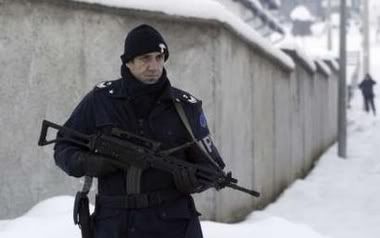 SARAJEVO, Bosnia (November 24,2007) – The Bosnian Human Rights and Refugees Minister Safet Halilovic stated at a press conference in the Bosnian capital Sarajevo that the Bosnian State Strategy for Implementation of the Annex 7 of the Dayton Agreement needs to be revised.
SARAJEVO, Bosnia (November 24,2007) – The Bosnian Human Rights and Refugees Minister Safet Halilovic stated at a press conference in the Bosnian capital Sarajevo that the Bosnian State Strategy for Implementation of the Annex 7 of the Dayton Agreement needs to be revised.The Annex 7 concerns the return of all the refugees and displaced persons to their homes.The strategy needs to be revised, for 12 years past the signing of the Dayton Agreement, there is a lot more to be done. A lot more money is needed to achieve the final goal, which is that all the refugees and displaced persons return home. This is the first time that the issue of financial compensation for the persons whose property was destroyed is considered.
”The Bosnian Human Rights and Refugees Ministry and UNESCO are cooperating in the process of revising the Dayton Agreement Annex 7 Implementation Strategy, for the purpose of fulfilment of all the goals set. They will also cooperate with the department entity institutions and with the international organizations and civil sector representatives in Bosnia," Halilovic said.
"A special action plan for the revision of Strategy has been developed. It defines the way in which all the relevant institutions, both domestic and foreign, both governmental and non-governmental are involved in the process of finding a solution and taking all the measures necessary to implement the Annex 7. It is a very complex fact. Participation of about 70 governmental and non-governmental institutions has been planned”, Halilovic stated at a press conference.
”UNHCR remains dedicated to the supervision and offering support to the implementation of the Annex 7 of the Dayton Agreement. There is a lot more to be done prior to creating conditions for all Bosnian citizens to access the rights provided by the Annex 7”, the UNHCR official Hussaina Naveeda said.
After the 1992-1995 Serbian,Montenegrin and Croatian aggressions against Bosnia ended, Bosnia faced with about 2,2 million refugees and displaced persons, which makes about 55 per cent of the pre-war population, which counted 4,3 million people.
Of about 1,2 million apartment units in the private and social ownership, about 445.000 apartments were torn down during the war. Additional 211.000 apartments now have new owners.
Communal and social infrastructure was almost completely destroyed. About 4 per cent of the state territory was under mines.
An enormous number of the people killed, the number of veteran and civil invalids, destroyed and separated families are only some of the realities Bosnia needed to face with after signing of the Dayton Agreement in 1995.
Some UNHCR date states that the number of returnees registered so far is 1.025.000. Most of them, over a half, returned in the first three years after the war ended.
In the first years after signing of the Dayton Agreement, the return processes were coordinated by the International Community.
In 2002, the Bosnian Ministry of Human Rights and Refugees developed the Strategy for Implementation of the Annex 7 of the Dayton Agreement.The Strategy was adopted in 2003 and was the first frame document which defined the goals and needs of the action reform aimed to implement the reforms needed for implementation of one of the most important annexes of the Dayton Agreement.
”The Bosnian Ministry of Human Rights and Refugees is determined to cooperate with other relevant institutions, primarily with the UNHCR so that the Annex 7 is fully implemented. The process must not end until the last refugee or displaced person is back to his or her home”, Minister Safet Halilovic said.







